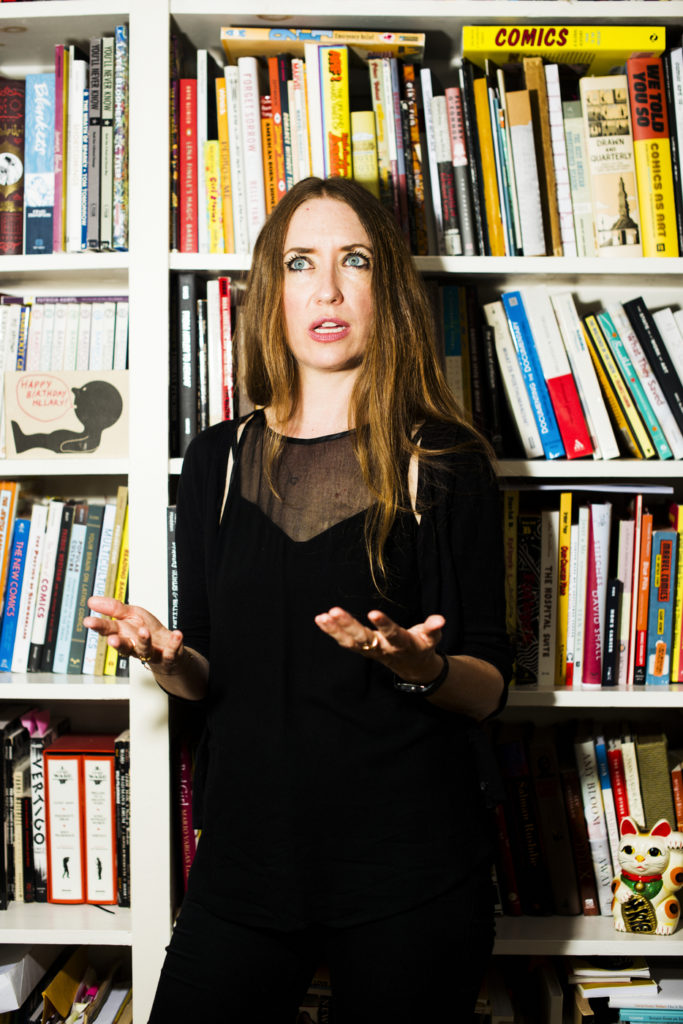Hillary Chute has always gravitated to English and writing. So much so, in fact, that she remembers asking her high school English professor if she could write two papers instead of one for class. Her passion flourished as she attended Oberlin College and grew increasingly fond of the academic environment inherent to the field.
“I looked around at my professors, whom I admired so much, and I thought, ‘I want to do this for my life too, because you get to be around interesting people all the time,’” she says. “And by interesting people, I mean students. I just thought being able to have these conversations for your life’s work with students in the classroom and talk about ideas just seems like the ideal profession.”
In 2006, she received her PhD in English from Rutgers University. While at Rutgers, she first became interested in comics and graphic novels–and how the visual and the verbal work together in an effective manner–which remains a keen focus of her work today.
“I think it was when I was in graduate school and I first read Art Spiegelman’s “Maus” that I read the kind of story that I knew I could spend decades and decades thinking about,” says Chute about the prominent graphic novel about the Holocaust. “[Maus is] a story about history and a story about world historical conflict and also a deeply personal story about families. That work just blew my mind, and it still blows my mind, more than 20 years after I first read it.”
This fall, Chute will release her own edited collection reflecting on the novel’s present-day importance, titled “Maus Now.”
Chute says what intrigued her about the work was how a serious story could be told in comic form. It raised important questions about the form for her: “How come this works so well? How come this is so moving and so effective and so complicated and so intricate?” Following that, Chute sought out similar comics and found many, opening a new world for her.
Now, as a distinguished professor of English and Art + Design at Northeastern University, Chute focuses on bringing that same eye-opening knowledge of comics to other students.
“I have dedicated, just personally, many years in the past two decades and a lot of energy into doing the field building that makes it more accepted and more possible for people to study comics at all levels,” she says. “You know, here and there, you get people who are snide. But I would say, for the most part, what I’ve found is people are interested. People are interested in stories that move people.”
Acknowledging that studying comics may seem trivial to some, Chute works hard to ensure that her classes tackle comics with the complexity and depth they deserve.
“There can sometimes be a misconception because of this cultural idea that comics equal a less complicated version of a prose book or a clunkier version of a film that somehow it’s a medium that represents a lesser-than iteration of a story,” she says. “And that’s the opposite of what we’re engaging in during my class. What we focus on is, ‘Why is this story being told in this media? What can comics do that other forms do differently? What can it show us? What can it make us think about it as a medium?’”
During her time at Northeastern, Chute has had a variety of students in her classes, including “non-humanities” majors who may typically have no background to engage in a course about comics. But every one of those students has excelled and finished the class with a greater appreciation and love for the medium.

“What I hope [students] take away is a knowledge that powerful storytelling happens in all different kinds of forms,” she says.
“I think students are often struck by the depth of the work that we read in the class and they’re not necessarily expecting it. Paying attention to that is something that can really benefit people who care about storytelling and narrative…and how to look at images and the world around them.”
While her position at Northeastern isn’t the first faculty position she’s held, she deeply appreciates the chance the university gives her to work with a diverse group of students.
“One of the things I find really appealing about Northeastern is being split between CAMD and CSSH,” she says. “For me, it’s such a benefit to be able to teach different kinds of students in the classroom, and specifically to be able to teach them in the same classroom. I just really love teaching a class in which there are some students who are, you know, design majors, and they’re bringing that perspective. [There are] some students who are English majors and some students who are computer science majors. Having students from different areas of the campus talking to each other…that’s just a gift.”




